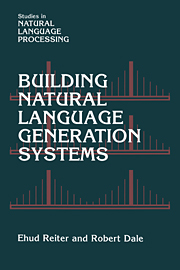Book contents
5 - Microplanning
Published online by Cambridge University Press: 25 August 2009
Summary
In the preceding chapter, we looked at how the document planning component of an nlg system can produce a document plan that specifies both the content and overall structure of a document to be generated. The task of the microplanning component is to take such a document plan and refine it to produce a more detailed text specification that can be passed to the surface realisation component, which will produce a corresponding surface text.
The document plan leaves open a number of decisions about the eventual form of the text in the document to be generated. These finer-grained decisions are made by the microplanning component. In the nlg system architecture used in this book, the microplanner is concerned with
Lexicalisation. Choosing the particular words, syntactic constructs, and mark-up annotations used to communicate the information encoded in the document plan.
Aggregation. Deciding how much information should be communicated in each of the document's sentences.
Referring expression generation. Determining what phrases should be used to identify particular domain entities to the user.
The result is still not a text. The idiosyncrasies of syntax, morphology, and the target mark-up language must still be dealt with. However, once the text specification has been constructed, all substantive decisions have been made. It is the job of the surface realiser, discussed in Chapter 6, to then construct a document in accordance with these decisions.
We begin this chapter by presenting our view of the microplanning task in Section 5.1.
- Type
- Chapter
- Information
- Building Natural Language Generation Systems , pp. 114 - 158Publisher: Cambridge University PressPrint publication year: 2000



